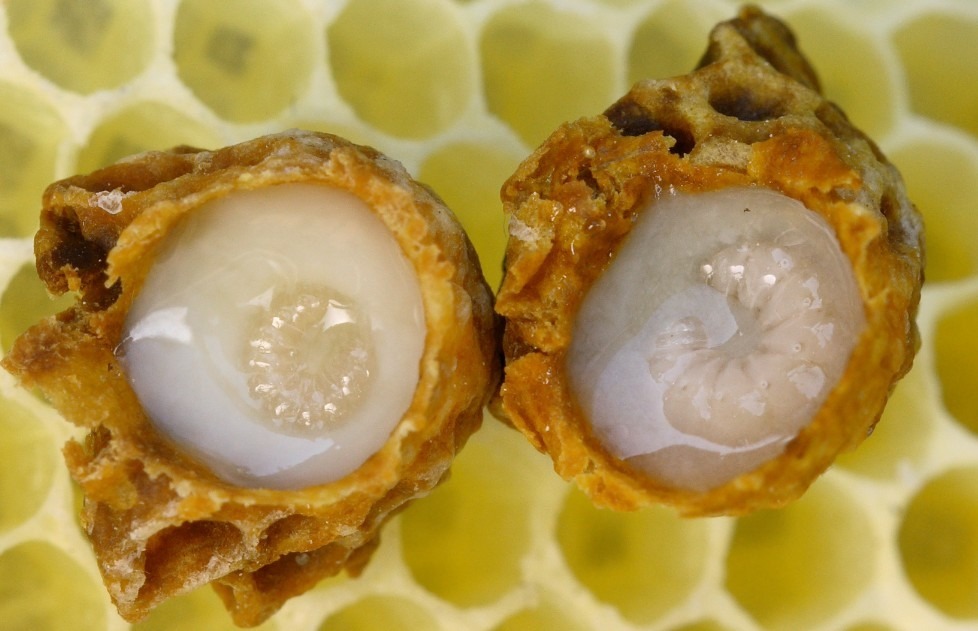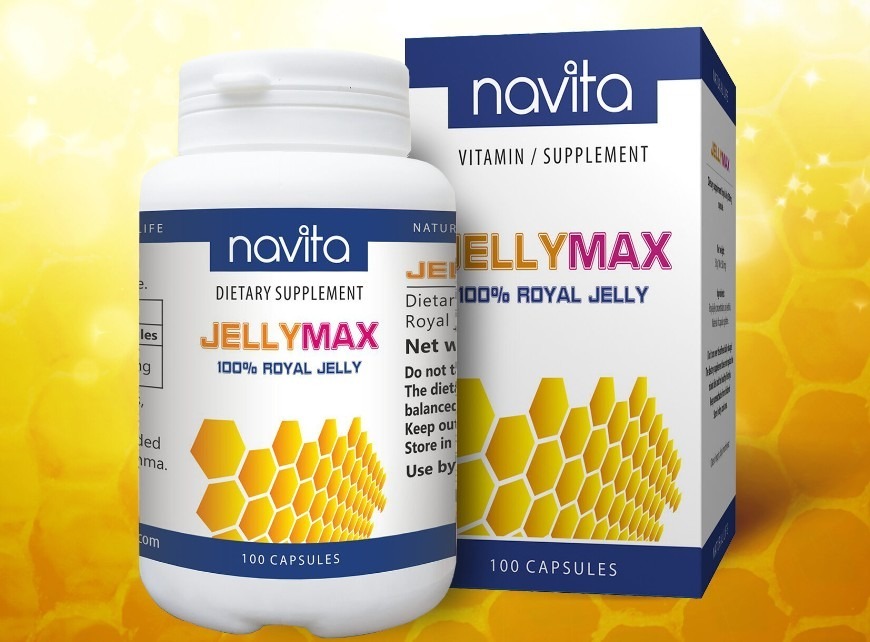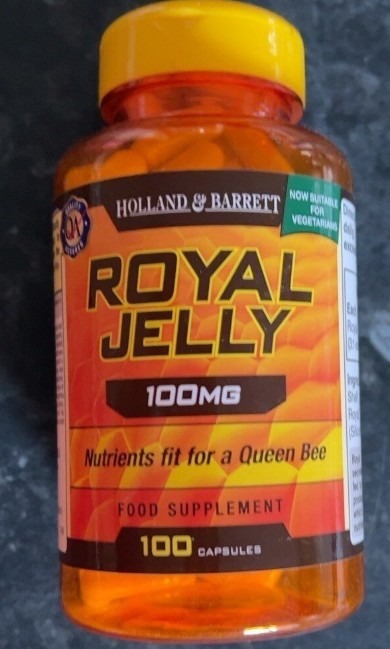The nurse bees in a colony secrete royal jelly to feed the larvae and the queen bee. There are numerous health benefits associated with using royal jelly, including treating everything from menopause to skin conditions.
In order to increase collagen production, alleviate premenstrual and postmenopausal symptoms, and improve overall health, beekeepers harvest royal jelly from the queen cells, which is sold as a supplement or included in skin creams.
What’s Royal Jelly?
Royal jelly is a milky-white substance that worker bees make and feed to the queen bee to help her grow up. Apis mellifera, Bee Saliva, Bee Spit, Gelée Royale, Honey Bee Milk, Honey Bee’s Milk, Jalea Real, Lait des Abeilles, and Royal Bee Jelly are all different names for Royal Jelly.
Royal jelly is made up of different things in different places, but a chemical analysis showed that it was made up of water, proteins, sugars, lipids, vitamins, and minerals, which made it a complete food for bees. This shouldn’t be a surprise, since this is the only thing queen bees eat their whole lives. Royal jelly didn’t have a lot of vitamin E, but it did have something that would help the bee larvae fight off infections in the warm, moist environment where they live at the bottom of a honeycomb cell.
Royal jelly contains 66.05 percent moisture, 12.34 percent protein, 5.46 percent lipids, 12.49 percent reducing substance, 0.82 percent minerals and 2.84 percent of unidentifiable elements. In this complex mixture, you can find natural hormones, enzymes, biocatalysts, and a lot of B vitamins, such as thiamine, riboflavin, pyridoxine, niacin, pantothenic acid, biotin, instol, and folic acid. You can also find vitamins A, E, C, and acetylcholine, as well as 20 different amino acids, fatty acids, sugars, sterols, phosphorous compounds (including DNA and RNA) and a gelatinous precursor of collagen. Royal jelly also has gamma globulin, an immune-stimulating factor that fights infections, and decanoic acid, which has strong antibiotic properties.
Uses for Royal Jelly
Alternative medicine has used royal jelly as a possible way to treat the symptoms of menopause. For this condition to be treated, royal jelly may have been mixed with other plants or extracts to make a special medicine.
People have also used royal jelly to treat hay fever. But research has shown that royal jelly might not help with this condition.
Other uses that haven’t been proven by research include treating premenstrual syndrome, infertility, high cholesterol, diabetic foot ulcers, stomach ulcers, pancreatitis, liver or kidney disease, asthma, skin disorders, and many other conditions.
It is not known for sure if royal jelly can help treat any kind of illness. The FDA hasn’t given its OK for this product to be used as medicine. You shouldn’t use royal jelly instead of medicine your doctor has given you.
Herbal supplements often contain royal jelly. There are no rules about how many herbal compounds should be made, and some supplements on the market have been found to contain toxic metals or other drugs. To reduce the risk of contamination, herbal and health supplements should be bought from a reliable source.
People even say that royal jelly can slow down the aging process by getting rid of free radicals and fight infections by making the immune system stronger. It is also used to improve health and make people stronger (not only to treat specific health conditions).
What Royal Jelly Can Do for You
Research shows that royal jelly might be good for your health in many ways. But royal jelly can also cause problems for people with certain allergies or health conditions.
Research has shown that royal jelly might be good for your health in a number of ways:
Antibacterial properties. Different kinds of bacteria have shown that royal jelly can kill them. And a review study that was published in Microbiological Research found that royal jelly helped fight bacteria and was even effective against many bacteria that were resistant to many drugs.
Based on this research, the jelly may help the immune system or make it work better. The evidence suggests that royal jelly could be a useful ingredient for making antibacterial medicines in the future.
Antiviral properties. Royal jelly is good against viruses, including the herpes simplex virus, in addition to being good against bacteria. In one study, royal jelly was found to stop the growth of the herpes simplex virus type 1 (HSV-1) and lower the number of viruses. This suggests that royal jelly could be used instead of antiviral drugs to treat viral infections.
Diabetes management. In a systematic review, it was found that royal jelly is a good way to treat diabetes mellitus. It worked to lower blood sugar, improve lipid profiles, and reduce oxidative stress.
Researchers looked at the effects of royal jelly on fasting blood sugar in 61 healthy people over the course of six months. After six months, people who took 3,000 milligrams of royal jelly every day had lower fasting glucose levels than those who took a placebo.
Another small study, which was published in the Chinese Journal of Integrative Medicine, looked at 50 women with type 2 diabetes and found similar results. Half of the women in this pilot study took one gram of royal jelly gel every day for eight weeks, while the other half took a sugar pill instead.
Researchers found that the blood sugar levels of women who took royal jelly supplements were lower. And their levels were lower than the control group women’s.
Menopause support. Royal jelly might help with a lot of the problems that come with menopause. In a randomized clinical trial with a placebo group, women who took 1,000 mg of royal jelly every day for eight weeks felt better.
In another study, women with menopause symptoms who put royal jelly in their vaginal canals had more lubrication and less vaginal atrophy.
The making of collagen. Royal jelly is a common ingredient in skin creams, and research backs up its use as a way to boost collagen. By making the skin make more collagen, royal jelly also helps protect the skin from the effects of UV radiation. Durham Royal Jelly is a beauty cream that can be bought in stores. This nourishing moisturizer was made for sensitive and delicate skin and will help keep your natural beauty for longer.
Lower cholesterol levels. Some research has shown that taking royal jelly supplements can lower cholesterol levels, even in people who aren’t in menopause. Forty people with mildly high blood pressure were looked at for a month in a small study that was published in Pharmaceutical Biology. For three months, half of the people took nine capsules of royal jelly every day. There were 350 milligrams of royal jelly in each capsule, which added up to 3,150 milligrams per day.
Researchers looked at their total cholesterol and “bad” LDL cholesterol levels and found that people who took royal jelly every day had lower levels of both.
Boost body’s immune system. According to research in Food Science and Nutrition, royal jelly might boost or stimulate antibodies, which are the body’s natural way of fighting off bacteria and viruses.
The study looks good, but it was only done on cells, so it’s very early and needs a lot more research, especially on people, to back up the results.
Animal studies suggest that royal jelly might also help treat dry eyes, reduce the side effects of cancer treatment, slow the signs of aging, and speed up the healing of wounds.
But there isn’t enough evidence to say that these benefits also work for people.
Conclusion
Both the U.S. Food and Drug Administration (FDA) and the European Health Safety Authority (EHSA) have decided that there is not enough evidence to support these uses. The FDA is taking more action against companies that lie about the health benefits of royal jelly.
There are many allergic reactions that can be brought on by royal jelly, from contact dermatitis to anaphylaxis. Be careful when you first try royal jelly, and stop using it if you have an allergic reaction.
There is a chance that royal jelly will react with other medicines you are taking. Before adding royal jelly to your diet, talk to your doctor or nurse to rule out any possible interactions.
It’s not clear what royal jelly does to a woman who is pregnant or breastfeeding. If you are pregnant or nursing a baby, you should look for something else.



